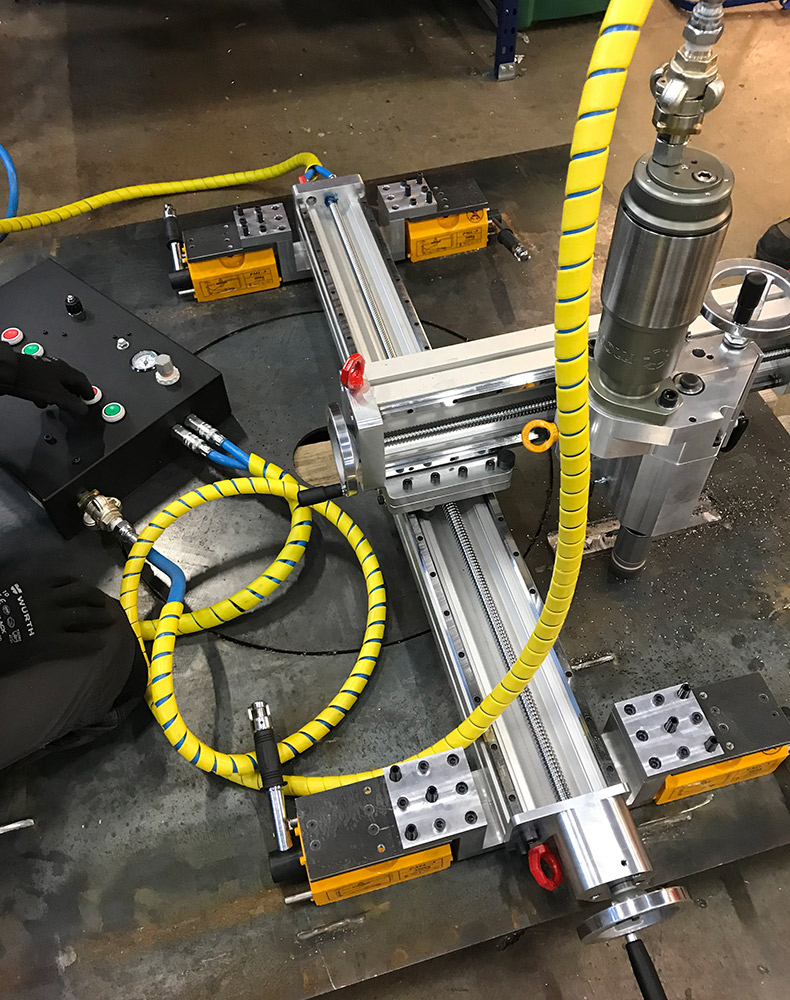The Benefits of Portable Milling Machines for Service Companies and Plant Operators
Introduction:
In the realm of industrial maintenance and repair, service companies and plant operators face numerous challenges when it comes to on-site machining operations. The use of portable milling machines has emerged as a game-changer, offering a host of benefits that significantly enhance efficiency, precision, and cost-effectiveness. In this blog post, we will explore how service companies and plant operators can leverage the advantages of portable milling machines to overcome operational hurdles and achieve optimal results.
Minimized Downtime and Increased Efficiency:
Downtime in industrial plants can be costly, resulting in production delays and revenue loss. Portable milling machines empower service companies and plant operators to perform milling operations directly on-site, minimizing the need for disassembly, transportation, and subsequent reassembly. By eliminating these time-consuming steps, portable milling machines significantly reduce downtime, allowing for quick repairs, modifications, or restoration of damaged components. The efficiency gained through on-site milling translates into enhanced productivity and cost savings.
Versatile Machining Capabilities:
Service companies and plant operators encounter a wide range of machining challenges, from repairing damaged equipment to modifying existing components. Portable milling machines offer a versatile solution, capable of performing various milling operations such as face milling, end milling, drilling, chamfering, and thread milling. The adaptability of these machines enables professionals to tackle complex machining tasks on different workpieces, including large industrial machinery, turbines, pumps, and pipelines. This versatility eliminates the need for multiple specialized machines, streamlining operations and reducing equipment costs.
Precision and Accuracy:
Maintaining precise tolerances is crucial for the longevity and performance of industrial equipment. Portable milling machines provide service companies and plant operators with exceptional control over the milling process, ensuring precise cuts, accurate dimensions, and smooth surface finishes. With advanced features like digital readouts, adjustable feed rates, and spindle speed control, professionals can achieve tight tolerances, align mating surfaces, and restore damaged components to their original specifications. The high level of precision offered by portable milling machines results in improved equipment performance, reduced wear and tear, and enhanced overall reliability.
Cost-Effective Maintenance and Repairs:
Traditional machining methods often involve the costly process of transporting large components to external machining facilities. Portable milling machines eliminate the need for transportation, reducing associated costs significantly. By conducting repairs and maintenance on-site, service companies and plant operators can save on logistics expenses, such as crane rentals, shipping, and labor for dismantling and reassembly. Additionally, on-site milling reduces the risk of damage during transportation, ensuring that repaired or modified components are installed accurately and without compromise.
Reduced Dependency on Original Equipment Manufacturers (OEMs):
Relying solely on OEMs for specialized machining services can result in lengthy lead times and high costs. Portable milling machines offer service companies and plant operators the independence to perform in-house machining tasks quickly and efficiently. By having the capability to address immediate repair or modification needs, businesses can minimize reliance on external service providers and accelerate the maintenance and repair process. This increased autonomy translates into improved operational control, reduced costs, and enhanced overall efficiency.
Customization and Adaptability:
Industrial plants often require customized solutions to address unique equipment configurations or specific maintenance requirements. Portable milling machines offer the flexibility to adapt to various workpiece sizes, shapes, and materials, enabling professionals to cater to specific plant needs. The machines can be equipped with specialized attachments and tooling configurations to perform intricate milling tasks, ensuring a tailored approach to each project. This adaptability enhances the ability to address complex machining challenges effectively, resulting in optimal outcomes and increased customer satisfaction.
Conclusion:
Service companies and plant operators in the industrial sector can greatly benefit from the use of portable milling machines. These versatile tools offer minimized downtime, increased efficiency, versatile machining capabilities, precision and accuracy, cost-effective maintenance and repairs, reduced dependency on OEMs, and customization options. By incorporating portable milling machines into their operations, service companies and plant operators can streamline maintenance and repair processes, enhance productivity, and ultimately optimize the performance and reliability of their industrial equipment.


